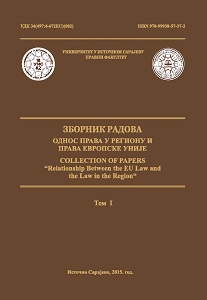Заштита људског достојанства у праву Србије и праву Европске уније
Protection of Human Dignity in Law of Serbia and in Law of the European Union
Author(s): Rodoljub Etinski
Subject(s): Law, Constitution, Jurisprudence, EU-Legislation
Published by: Правни факултет Универзитета у Источном Сарајеву
Keywords: Human dignity; Serbia; European Union;
Summary/Abstract: The article investigates a relationship between human dignity and human rights, comparatively in the two legal systems. It refers shortly to a legal concept of human dignity and explores the right to human dignity as a fundamental right in the two legal systems.Constitutional provisions on human dignity have appeared early in Serbia, in the first half of XIX century. They came together with human rights provisions. However, constitutional provisions on human dignity have been expanding in last decades. The actual 2006 Constitution is distinguished by extensive elaboration on human dignity. Article 19 of the Constitution determines purpose of constitutional guarantees of human rights in a way that it is preserving human dignity. Article 23 defines the right to human dignity and free development of an individual. Constitutional provisions on the right to freedom, the right to work and the right to social support refer to human dignity as a relevant standard. In spite of Article 19, the Constitutional Court of Serbia considers that a violation of a human right, guaranteed by the Constitution does not necessary mean an automatic violation of the right to human dignity. The author considers that a better option would be to take a stand that each separate human right expresses the right to human dignity in concrete situations and that a judicial finding on a violation of a separate human right would consume a violation of the right to human dignity.Protection of human rights in Community law, later in EU law has been developed through an interaction of national courts and the European Court of Justice. The provisions on human rights appeared firstly in a form of general legal principles. The European Court of Justice has protected human dignity as a common constitutional tradition of member states. The Charter on the Fundamental of the European Union of 2000, turned into a legal document of constitutional value by the Lisbon Treaty, begins by a protection of human dignity. Beside, the Charter refers explicitly to human dignity in a context of the right to adequate working conditions and respect for elderly people.The right to human dignity has been similarly defined in the Serbian Constitution and in the EU Charter on Fundamental Rights. A difference in a scope of applicability – the Constitution of Serbia is applicable to all social relations suitable for legal regulation and the EU Charter on Fundamental Rights is addressed to the EU institutions and state member when their acts are of relevance for EU Law – might be reflected in second part of definitions of the right to human dignity. Serbian version states: everyone shall be obliged to respect and protect it. And the EU version proclaims: It must be respected and protected. The first part is identical in both definitions: Human dignity is inviolable.After exploration of practice of the two courts, the author has found that,for the time being, the Constitutional Court of Serbia and the European Court of Justice apply provisions on the right to human dignity in conjunction with other human rights provision extending applicability of them to new situations or enriching them by a new legal content.
- Page Range: 18-35
- Page Count: 18
- Publication Year: 2015
- Language: Serbian
- Content File-PDF

